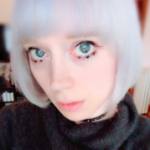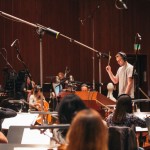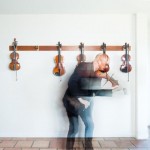So, did you think we let Kalafina get away without an interview after reading our coverage of their weekend concert at Anime Boston 2009 that went live this morning? Think again! Shortly after the concert and autograph session was over, OSV contributor Tommy Ciulla and I were fortunate to sit down with Yuki Kajiura and Kalafina to ask them some questions.
We delve a bit into Kajiura’s Xenosaga scores, some of her other projects, and into her musical direction. We also got to hear about Kalafina’s concert selection, their vocal style, and some of their favorite songs. You’ll hopefully find this informative, although I admit I was able to have a number of my own personal questions about the group answered.
Interested in hearing what they had to say? Check it out after the jump!
OSV: You have a very interesting style of composition, fusing together orchestral performances, rock, and electronica, and I particularly enjoy your use of violin, piano, and flute in many of your themes, such as “storm and fire.” What inspired you to go in this musical direction?
Kajiura: I started out with classical music as that is what my parents listened to. My older brother was into the Beatles, other British bands, and some of the electronic music so that’s how I got into the modern stuff. I also enjoy singing and have been in a choir group since pre-school, so that’s where it’s all coming from.
OSV: Hikaru, could you describe your experiences in auditioning for Kalafina and how you felt upon learning you were chosen for the group?
Hikaru: I originally attended an audition for Sony Music that wasn’t for Kalafina originally, but one of the staff managers approached me afterwards to audition for the group and now I’m here and am quite happy to have been selected.
OSV: In 2008, you performed a concert with Sound Horizon entitled Dream Port. What was the inspiration behind the collaborative melody you and Revo composed featured in “Saijin no kanata e…” and “sand dream” and would you consider collaborating with Revo again in the future?
Kajiura: I didn’t initially plan on doing the collaboration but as I talked with the Revo people about the direction I wanted to bring, we found it was difficult to collaborate with other composers as they clash sometimes. However, I wanted to try it and since it is difficult to do, we wanted to challenge that preconception. I really had a fun time doing it and would love to work with Revo again.
OSV: The vocal dynamics of Kalafina are quite diverse. Can you each describe what your voice brings to the project and how they work together to form a very moving experience?
Wakana: My vocal style is soprano. Are you familiar with the Kajiuran lyrics, words that are made up, but it’s her interpretation of expression? I sometimes sings the main melody, but I usually back up the melodies that the others are singing. I feel that this wouldn’t be possible if it wasn’t the three of us so I’m comfortable backing up the Kajiuran lyrics the other two sing and being an individual in Kalafina.
Hikaru: My vocal style is mezzo soprano. Wakana and Keiko think I have a brighter voice and vocal style. There really isn’t a distinguished part in Kalafina, so we change up the parts all of the time.
Keiko: My vocal style is usually alto. I support both Wakana and Hikaru, adjusting my vocal style to the way they are singing. For example, if Wakana’s voice has a sad tone to it, I’ll adjust accordingly and as an alto part, I would differentiate between if it was backing up Wakana or Hikaru as they both have very different styles. Of course, we all do the various parts, but I’m usually in a supporting role.
OSV: You recently released a single entitled “Parallel Hearts” featuring Wakana, Keiko, Kaori, and Yuriko Kaida, for the anime Pandora Hearts. Do you plan on continuing using this new version of FictionJunction in future projects?
Kajiura: Of course! They’ll be performing live in July in Tokyo and Osaka. In addition, Kalafina will be performing in Shibuya, Tokyo in August.
OSV: Kalafina was original formed to contribute to the Kara no Kyoukai series and has now branched out to contribute to other animes such as Kuroshitsuji and Rekishi Hiwa Historia. Do you think in the future you’ll produce an album featuring original compositions that aren’t tied to anime?
Kalafina: Definitely. We hope to work on various projects wherever they may be.
OSV: In one of your live concerts, one of my favorite performances was of “Godsibb” from Xenosaga III. Can you tell us why you chose to perform an arrangement of this particular theme from the Xenosaga series as opposed to other stellar compositions, such as “Promised Pain” or “Fatal Fight (Jin and Margulis)?”
Kajiura: That particular song was much easier to play with a band as opposed to an orchestral piece, which is much harder to perform.
OSV: Continuing with the Xenosaga series, if I may, your contributions for the titles you worked on were quite different. In Xenosaga II, you were responsible for the cutscene music, whereas in Xenosaga III you were responsible for the entire score. Did you find it more difficult composing the music for the third one, considering the amount of music was much broader in terms of style and scope? What was your inspiration in composing the music for both of these games and did you collaborate at all with Shinji Hosoe?
Kajiura: It’s about the same difficulty for both games. I was in charge of both games. It was definitely a fun and challenging experience. I used background pictures and the worldview mainly for my inspiration. As for my work with Shinji Hosoe, I never actually met him, unfortunately, so we didn’t work together on any pieces.
OSV: What is the back story and inspiration for “Promised Pain” from Xenosaga III?
Kajiura: It was used as the song for the last battle. There was such a long history for the individual characters. They have such a heavy history to it and its times three now, being the third game in the series so I felt I had to cover all of [their history] when creating the theme.
OSV: Considering the amount of themes on your Seventh Heaven album, what was the reasoning behind the tracks chosen for the performance?
Kalafina: The encore, with Kajiura performing on the piano, was obviously something we wanted to put in the end and the other themes were chosen based on how well we felt they would flow during our rehearsal sessions.
OSV: My personal favorite Kalafina song is “Kizuato.” I just really enjoy the range in vocals and the musical direction. What are some of your favorite songs that you’ve sung and why?
Wakana: Definitely “Kizuato” as well. The lyrics in “serenato” are very deep and very special so it’s another favorite of mine.
Hikaru: For me, it would be “Gloria.” It’s a simple setting, but it’s very melodious so that’s why I like it.
Keiko: For me, it would be “Ongaku” because I like to perform it live.
OSV: Kajiura-san and Kalafina, is there anything else you would like to tell your fans?
Wakana: I’m definitely honored to have been invited today to perform in Boston as this was the first time performing outside of Japan. I would like to continue doing that, depending on where it is, and would like to explore [the group] even further.
Hikaru: The next time we perform globally, definitely check us out!
Keiko: I’d definitely want to come back to Boston. It’s really one of my favorite cities now. I’d really want to share the music with the rest of the world.
Kajiura: There’s no border with music, especially these days with the Internet. I enjoy African to Venezuelan music, but I don’t understand what the lyrics are so I hope you can listen and not consider them just Japanese music, but as Kalafina globally.
OSV: Thank you very much for your time, Kajiura-san and Kalafina. It was a pleasure.
[Special thanks to Ryu Takahashi for translating during the interview]
Tags: Anime Boston 2009, Interviews, Kalafina, Xenosaga, Yuki Kajiura









































Freaking awesome. Again, so jealous I couldn’t be there, but thanks for asking my question about “Promised Pain.” It’s actually better that I wasn’t there, because I’d just want to talk about Xenosaga the entire time.